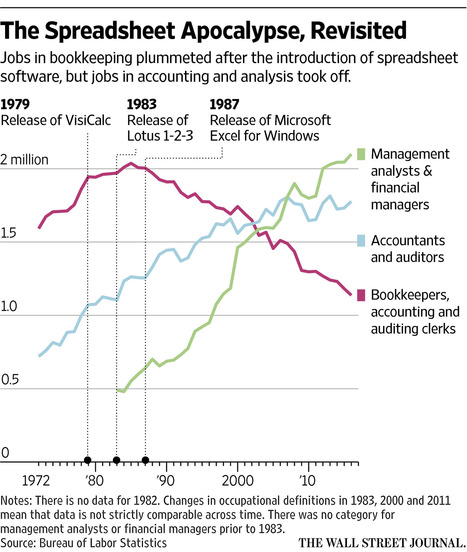 Source of graph: online version of the WSJ article quoted and cited below.
Source of graph: online version of the WSJ article quoted and cited below.
(p. A2) Whether truck drivers or marketing executives, all workers consider intelligence intrinsic to how they do their jobs. No wonder the rise of “artificial intelligence” is uniquely terrifying. From Stephen Hawking to Elon Musk, we are told almost daily our jobs will soon be done more cheaply by AI.
. . .
Until the 1980s, manipulating large quantities of data–for example, calculating how higher interest rates changed a company’s future profits–was time-consuming and error-prone. Then along came personal computers and spreadsheet programs VisiCalc in 1979, Lotus 1-2-3 in 1983 and Microsoft Excel a few years later. Suddenly, you could change one number–say, this year’s rent–and instantly recalculate costs, revenues and profits years into the future. This simplified routine bookkeeping while making many tasks possible, such as modeling alternate scenarios.
. . .
The new technology pummeled demand for bookkeepers: their ranks have shrunk 44% from two million in 1985, according to the Bureau of Labor Statistics. Yet people who could run numbers on the new software became hot commodities. Since 1985, the ranks of accountants and auditors have grown 41%, to 1.8 million, while financial managers and management analysts, which the BLS didn’t even track before 1983, have nearly quadrupled to 2.1 million.
For the full commentary, see:
Greg Ip. “CAPITAL ACCOUNT; We Survived Spreadsheets; We’ll Survive AI.” The Wall Street Journal (Thursday, August 3, 2017): A2.
(Note: ellipses added.)
(Note: the online version of the commentary was updated Aug. 2, 2017, and has the title “CAPITAL ACCOUNT; We Survived Spreadsheets, and We’ll Survive AI.”)

